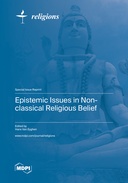Explore

Epistemic Issues in Non-classical Religious Belief
0 Ungluers have
Faved this Work
Login to Fave
This Special Issue addresses philosophical questions regarding various non-classical religious beliefs. The contemporary philosophy of religion includes an active and venerable tradition of arguments concerning religious beliefs. While some new approaches address different questions, the vast majority address the belief in and nature of God. Frequently, ‘God’ is defined as a perfect being: a supernatural being with the greatest powers and qualities (omniscience, omnibenevolence, necessity, omnipresence, etc.) who created the universe. This concept of God is often labeled as ‘classical theism.’ While defining ‘God’ as a perfect being is fairly common in Abrahamic religious traditions, it is far less prevalent in non-Western traditions. In Indian religions, Gods are bound by karma and therefore not omnipotent. In Afro-American traditions, vodoun or loa are sometimes regarded as localized and therefore not omni-present. Many adherents of Christianity, Islam, and Judaism also hold beliefs on ‘intermediary’ supernatural beings that lack perfection, such as angels, demons, and Jinn. This Special Issue contains publications that discuss various topics pertaining to non-classical religious beliefs, including the epistemic features of belief in spirits or demons, belief in angels, belief in animism, process theism, Indian beliefs and practices, Chinese philosophy of religion, Afro-Brazilian practices, and neo-pagan spirituality.
This book is included in DOAB.
Why read this book? Have your say.
You must be logged in to comment.
